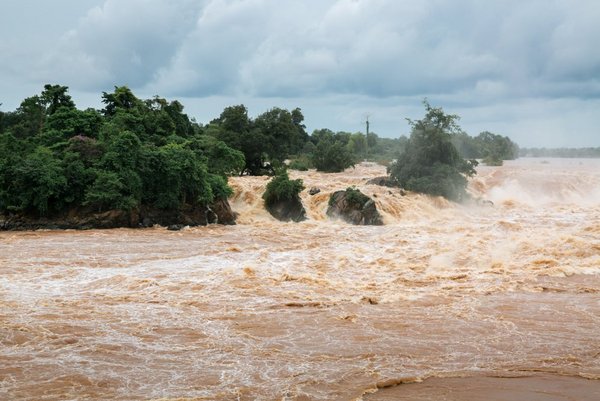 Read this article in French
Read this article in French- Share this article
- Subscribe to our newsletter
Water quality deteriorating in rivers worldwide
The study, published in Nature Reviews Earth and Environment, shows that river water quality tends to deteriorate during extreme weather events. As these events become more frequent and severe due to climate change, ecosystem health and human access to safe water may be increasingly under threat.
The analysis reviewed 965 cases of river water quality changes during extreme weather such as drought, heatwaves, rainstorms and flooding, as well as under long-term (multi-decadal) changes in climate.
“We looked at various water quality constituents such as water temperature, dissolved oxygen, salinity and concentration of nutrients, metals, microorganisms, pharmaceuticals and plastics,” notes study lead author Michelle van Vliet of Utrecht University in the Netherlands.
Water quality changes during droughts and floods
The findings show that, in most cases, water quality tends to deteriorate during droughts and heatwaves (68%), rainstorms and floods (51%), and under long-term changes in climate (56%). During droughts, less water is available to dilute contaminants, while rainstorms and floods generally result in more contaminants that run off from land to rivers and streams. Improvements or mixed responses in water quality are also reported for some cases owing to counteracting mechanisms, for example, when increased transport of pollutants is offset by more dilution during flood events.
Water quality changes are strongly driven by changes in river discharge and water temperature. Land use and other human factors such as wastewater treatment also shape how this plays out.
The authors highlight that understanding the complex interplay between climate, land use and human drivers, which together influence the sources and transport of pollutants, is crucial.
The research also calls for more data collection and studies of water quality in non-Western countries to facilitate better monitoring and understanding of water quality in Africa and Asia, as most water quality studies now focus on rivers and streams in North America and Europe.
"As extreme weather events intensify due to climate change, our rivers and aquatic ecosystems face growing threats to their health and functioning, and human access to safe water is increasingly imperilled. The intricate interplay between climate, land use and human factors demands our immediate attention. To safeguard our access to clean water and preserve ecosystem health and biodiversity in an era of escalating weather extremes, we must prioritise a deeper understanding of these dynamics through conventional monitoring and innovative data collection as well as the development of effective water management strategies," concludes study co-author Ting Tang, a researcher in the Water Security Research Group of the Biodiversity and Natural Resources Program at the International Institute for Applied Systems Analyses (IIASA).
(Utrecht University/IIASA/wi)
Reference: van Vliet, M.T.H., Thorslund, J., Strokal, m., Hofstra, N., Flörke, M., Ehalt Macedo, H., Nkwasa, A., Tang, T., Kaushal, S.S., Kumar, R., van Griensven, A., Bouwman, L. & Mosley, L.M. (2023). Global river water quality under climate change and hydroclimatic extremes. Nature Reviews Earth and Environment. DOI: 10.1038/s43017-023-00472-3





Add a comment
Be the First to Comment